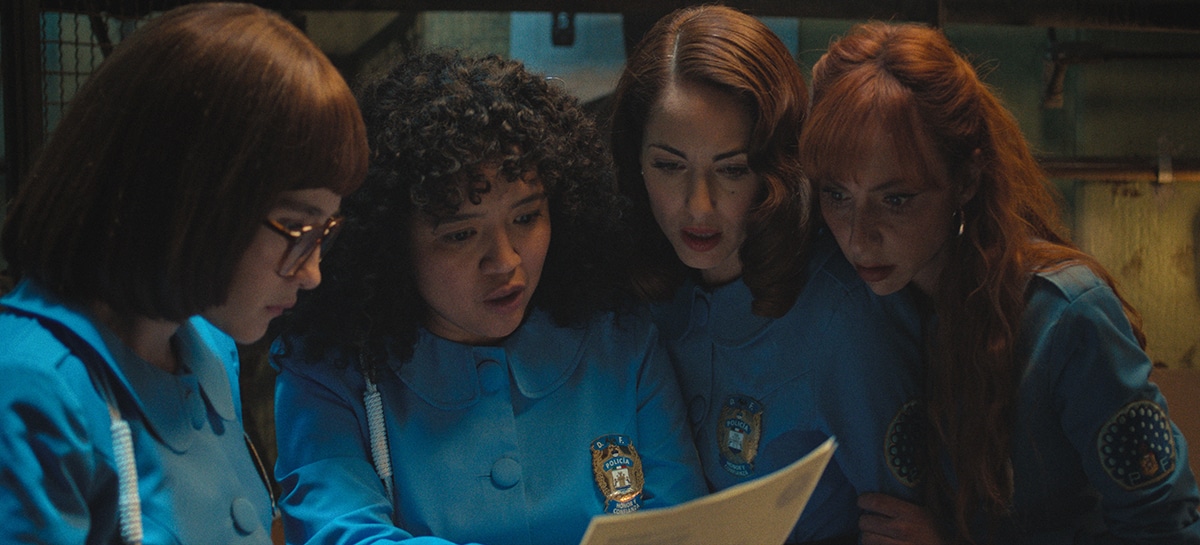Following the remarkable success of productions filmed in Mexico such as Acapulco and The Mosquito Coast, Apple TV+ brings us Las Azules aka Women in Blue, a Spanish-language crime drama inspired by true events. Co-created by Pablo Aramendi (Los Hombres de Paco) and International Emmy Award winner Fernando Rovzar (Sr. Avila, Monarca), Las Azules offers an inside look at Mexico City’s first female police force by centering on four female agents, each of whom attempts to redefine what it means to serve and protect in a male-dominated institution.
Set in conservative 1970s Mexico, Las Azules follows the first female police squad and their hunt for a maniacal and brutal serial killer, even though the new policy chief Emilio Escobedo (Christian Tappan) would rather they all just pose for photos.
Our four are María, Gabina, Valentina, and Angeles. María (Bárbara Mori), is determined to carve out her own future after years of adoring an unfaithful husband. Joining her is Gabina (Amorita Rasgado), who is following in the footsteps of her father and brothers, all police officers. Valentina (Natalia Tellez) is the activist who wants to change institutional politics from within. And finally, there’s the discreet Angeles (Ximena Sariñana), a brilliant analyst and devout religious woman who does her best to care for her ailing grandmother.
Although figuring out the serial killer’s identity is the show’s narrative engine, the truly crucial issue in Las Azules is the undervaluing of women both personally and professionally or as actress Natalia Tellez, told the LA Times, “the most important thing about Las Azules is the struggle of women trying to be themselves and have some space within society.”
Inspired by Real Events
First of all, know that Mexico was one of the first countries in the world to establish a female police force. As early as the 1930s, the Mexicans laid the foundations for the “Women’s and Interpreters’ Police,” made up of 69 women, who were assigned to social welfare work. However, in a male-dominated professional environment, the female recruits faced hostile reactions and resistance and did not last long in the profession.
Later, in the 1970s, the government of President Luis Echeverría would reincorporate a female police squadron. It is said that, due to the immense social tension generated by unfortunate events such as the Tlatelolco massacre in 1968 and El Halconazo in 1971, the authorities were inclined to admit a small group of female police officers with the intention of humanizing and revitalizing the institution’s image. Beyond performing security tasks, the idea of the women’s police was to divert the media’s attention from the violence that was shaking the country.
It is these events that captivated screenwriter Pablo Aramendi and served as inspiration for the plot of Las Azules. As part of the research process, Pablo Aramendi, Fernando Rovzar, and the main cast of this series met with some of the original Las Azules, learning about the relentless sexism they faced. Aramendi told El Universal that, “The series does not tell the lives of the real policewomen, but we did use anecdotes of what their training was like, how they related to each other, what it was like to arrive in a man’s world.”
Details that Make the Difference
Shot in more than 80 locations, ranging from the capital to Puebla, Las Azules is an extraordinarily attractive series to watch. The imaginative Carlos Lagunas was in charge of the production design and managed to impeccably recreate the spirit and atmosphere of the early seventies. For such an endeavor, the Ariel Award winner made use of the iconic local architecture and built sets in Gabriel García Márquez’s studios in Tlalnepantla.
It is precisely the deluge of detail – the costumes, the cars, the music, the atmosphere, the meticulous sets – that makes Las Azules such a feast for the eyes. I wouldn’t go so far as to say that production design breaks new ground, but the Las Azules team gets it right. Every location, every angle and every detail is deliberately reasoned to fully immerse the viewer.
In addition, the soundtrack supervised by the late Lynn Fainchtein Steider (The Revenant, Birdman, 21 Grams) and composed by Lucas Vidal (Ni Una Más) beautifully underscores the dramatic development of the plot.
So, Should You Watch It?
While Las Azules isn’t going to set the world on fire, it’s an entertaining series that’s worth binge-watching. Aimed at an adult audience with a taste for crime dramas (true or otherwise), the Mexican production is at its best when it focuses on its female agents and makes bold decisions regarding its central mystery.

